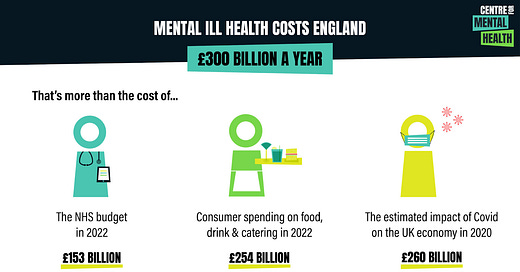There has been a lot of talk over the last few months about the decreasing health of the workforce. We mentioned in a previous blog that there has been an increased number of people not being able to seek a job because of long term illness, both during and after the COVID-19 pandemic, which may have as an economic consequence lower economic growth. Furthermore, young people especially millennials and Gen Z are getting more and more unhappy as years pass, deteriorating their economic and social wellbeing.
One of the reasons for this phenomenon is the increase of mental health illness since the COVID-19 pandemic. 6.3% of people in England were known to be in contact with secondary mental health, learning disabilities and autism services during this year. This is compared to 5.8% of people in 2021-22 and 5.0% of people in 2020-21. There is no doubt that since the COVID-19 pandemic there is a higher demand for good quality of mental health services.
Further research from ONS revealed that in July 2019 and March 2020, the prevalence of depression was 10%, but this rose to 19% by June 2020 and 21% by January-March 2021. By September-October 2022 the proportion had fallen to 16%. ONS also mentions that rates of depression were higher among those who found it hard to afford housing costs or energy bills, and higher among renters than homeowners; as a consequence the increased cost of living has kept the depression rates above from its pre-pandemic levels among British people.
But why do economists care about depression levels and other mental health illnesses?
If you suffer from depression, like me you know that many days are very difficult, feeling it is very hard to get out of bed and with no purpose in life. That may have an effect on our productivity and our ability to be fit for work. According to 2023 Britain’s Healthiest Workplace survey from Vitality, mental health issues had the greatest negative impact on productivity. People at risk of depression, fatigue and burnout lose 151%, 141% and 120% more productive days respectively, compared to those who do not report these health issues.
According to research from the University of Sheffield, a decrease in mental health is related with lower productivity in the UK. Public Health England in 2020, estimated the total economic cost of sickness absence, lost productivity through worklessness, informal caregiving, and health-related productivity losses, are estimated to be over £100bn annually.
Research from the Centre of Mental Health on behalf of the NHS estimated that mental illness costs England £300bn a year, equivalent to nearly double the entire NHS budget. This estimate is made up of three main elements:
Economic costs of £110bn: Losses to the economy due to mental ill health. These include the business costs of sickness absence and ‘presenteeism’ at work, as well as staff turnover and unemployment among people with mental ill health.
Human costs of £130bn: The value, expressed in monetary terms, of reduced quality of life and premature mortality among people living with mental health difficulties.
Health and care costs of £60bn: This includes support provided by public services and informal care provided by family and friends.
What can employers do?
To get the most out of their employees, employers need to support the higher number of people suffering with mental health, especially if mental illness is related to the work environment. Recent research from the Workforce Institute revealed that our line managers have a higher impact on our mental health than our doctor or our therapist. And this is absolutely true: your career, performance and external validation depends on that one person who sometimes has undue control over your work life.
According to the survey results, one in three people interviewed say their managers fail to recognize the impact they have on their team’s mental well-being, and seven in 10 would like their company and manager to do more to support mental health.
Evidence which supports the assertion that lack of resilience of the workforce is not the issue, but the way that we approach and deal with mental health in the work environment. Vitality suggests that “better employee support, a focus on wellness and wellbeing, and proper benefit structures in place that also allow for back-to-work rehabilitation and physical and mental support, can play a crucial role to helping employers and employees.”
At the end of the day we need to remember that not being ok is ok! Our generation has faced multiple crises, economic downturns, wars and pandemics which have had a great impact on our personal wealth and wellbeing that our parents’ generation didn’t necessarily have to face in the prime of their lives. Of course our mental health is going to be affected by all of that and what we need is a supportive environment at work that allows us to thrive.




